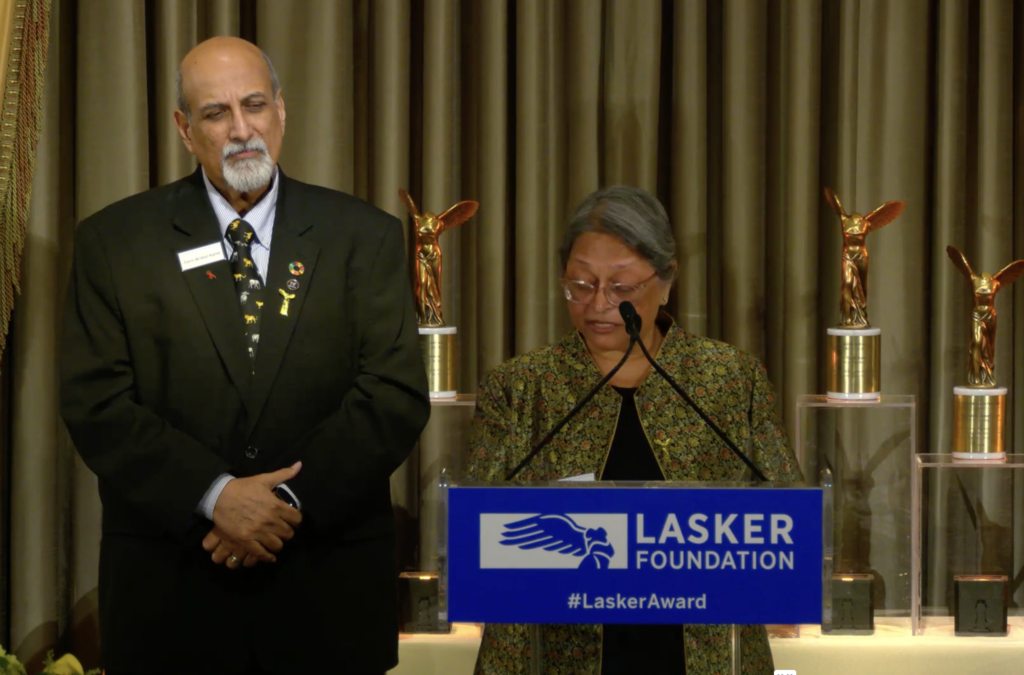
By Nabeelah Shaikh
In a landmark recognition of their profound impact on public health, Professors Quarraisha Abdool Karim and Salim Abdool Karim have been awarded the prestigious 2024 Lasker Bloomberg Public Service Award in New York.
The Abdool Karims were honoured at a gala ceremony on September 27. The esteemed scientists from Columbia University Mailman School of Public Health and the Centre for the AIDS Program of Research in South Africa (CAPRISA) have been recognised for their tireless efforts in combating HIV/AIDS.
The Lasker Foundation lauded the Abdool Karims for “saving lives around the globe through their innovative research, evidence-based policy proposals, public education, and courage to speak truth to power.”
The Lasker Awards, established in 1945 by biomedical research advocates Mary and Albert Lasker, are considered America’s premier biomedical research prize, recognising significant contributions to human health.
The Foundation said the Abdool Karims have worked side-by-side as spouse scientists tackling devastating diseases while overcoming scientific and political obstacles.
Dr. Linda Fried, dean of Columbia’s Mailman School of Public Health, said she was extremely proud of their achievements.
“At considerable professional risk, they confronted AIDS denial, provided life-sparing antiviral treatments in defiance of government policy and developed HIV prevention approaches that empower women to protect themselves. They established collaborative HIV research centres, working with international partners on vaccines, immunopathogenesis research, microbicides, and antiviral treatments.”
On accepting the award in New York City, Professor Quarraisha Abdool Karim said their lived experiences of growing up in apartheid South Africa have had a profound effect on how they see their role as scientists.
“As young anti-apartheid activists involved in the daily struggle for freedom, human rights and justice, we know the importance of human dignity and inclusiveness in all facets of life, including in our scientific endeavours. It is therefore not surprising that our careers veered towards public health and that we have spent over three decades focusing on the health of the most disadvantaged in our society – young black women,” said Quarraisha Abdool Karim.
She said the world was in a tumultuous moment globally – a time when science is needed more than ever to tackle several of the world’s most complex challenges —pandemics, climate change, man-made famines in the midst of conflicts and widening inequalities within and between countries.
“Our hope lies in the ubiquity of science, on it transcending political and cultural barriers as the universal language to build bridges between the peoples of this world. Our interconnectedness and shared vulnerabilities underscore the importance of working together as scientists in service of humanity to generate knowledge and innovations to make the world a better place for everyone,” said Quarraisha Abdool Karim.
Professor Salim Abdool Karim said that in accepting the award, both he and his wife recognised the power of global solidarity for global impact.
“This has been deeply imbued in our work on HIV prevention and treatment over the past 35 years. In a world wracked by division, conflict and anti-immigration hatred, this award is a sober reminder of how science reminds us of our shared humanity across the globe,” said Abdool Karim.
He said they have been awarded for their achievements because of the power of global solidarity and partnerships in science that have saved tens of thousands of lives and helped make the world a better place for generations to come.
The couple’s pioneering work in HIV prevention has culminated in the development of Pre-Exposure Prophylaxis (PrEP), an antiretroviral treatment now endorsed by the World Health Organisation as a crucial element in global HIV prevention strategies. Their research findings have shown that tenofovir, an ARV medicine, could reduce new infections by 39% in women who used it consistently for two and a half years, a breakthrough that has revolutionised the approach to HIV prevention.
Beyond their contributions to HIV/AIDS, the Abdool Karims have also played an essential role in addressing the COVID-19 pandemic.
They quickly pivoted to focus on SARS-CoV-2, providing vital surveillance and promoting evidence-based prevention methods.
The couple’s impact extends beyond research; they have trained over 600 African researchers through the Fogarty International Center’s Columbia University HIV training program. Their collective work has garnered numerous accolades, including membership in prestigious organisations like the U.S. National Academy of Medicine and the World Academy of Sciences. Salim Abdool Karim is also the first African scientist to be appointed to the editorial board of the New England Journal of Medicine.











